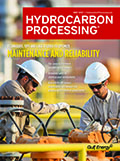
May 2021
Special Focus: Maintenance and Reliability
The Tüpraş İzmit refinery’s largest crude distillation unit (CDU) is designed with a preflash column prior to the atmospheric distillation column.
During the end-of-run (EOR) period of the authors’ company’s residue hydrodesulfurization (RDS) process in early February 2019, some hot spots occurred in the catalysts of the reactors.
Pressure vessels and piping constitute the maximum percentage of static equipment in any oil and gas facility.
The primary requirement for rerating or revamping an existing centrifugal compressor is to match the new operating requirements, such as increased or decreased flow, increased or decreased head, or a combination of both. Rerating or revamping is necessary where the existing compressor or compressor train is incapable of meeting the new operating requirement efficiently.
Industrial plants depend on accurate, reliable gas analysis for process control, efficiency, safety and emissions monitoring.
A process safety risk in industry is having unknown problems that are not accounted for.
The vessel and reactor operating in a refinery may undergo various deteriorations due to their operating conditions.
Valves, Pumps and Turbomachinery
Thermal imaging technology has evolved over the years, and investment costs have decreased significantly.
As with all industries, chemical manufacturing is evolving in response to technical innovations, new customer requirements and increased global competition.
Heat Transfer
Among all types of heat exchangers, shell-and-tube heat exchangers are in huge demand for industrial applications.
Process Controls, Instrumentation and Automation
Consumers likely imagine natural gas as a stream of pure methane. Those who are closer to the energy industry know that methane is the major component, but there can easily be dozens of other substances making up a sizeable portion of the total volume.
When applying averaging level control in a process plant, engineers can typically choose between proportional integral derivative (PID)-based control, such as p-only, gap and non-linear, or a model-based control like optimal averaging level control.
Environment and Safety
The human factor has played a significant role in chemical plant accidents and production loss incidents over the past 60 yr.
Columns
Refineries and petrochemical plants are comprised of a series of crucial processes to produce transportation fuels, products and chemicals demanded by the global market. These processes consist of capital-intensive units that must be maintained to provide reliable performance. Failure to adequately maintain these assets can have a detrimental effect to not only operations and profit, but also to worker safety.
A prominent manufacturer rediscovered the old axiom, “pushing the limit can have unexpected consequences,” after experiencing many bearing failures in its 40-hp air blowers. These lifetime-lubricated (sealed) bearings had been properly installed on 20-mm shafts, and it can be assumed that premium greases were being used.
An article on “Remote training of personnel”1 is interesting and appropriate at this time of COVID-19. It outlines the difficulties in presenting remote training courses and suggests methods that can help.
“It was the best of times, it was the worst of times, it was the age of wisdom, it was the age of foolishness…”. Fortunately, this opening line from A Tale of Two Cities does not often present itself as an appropriate analogy to the oil and gas industry. Yet, here we are.
Trends and Resources
Over the past several years, the world witnessed a significant increase in downstream capacity growth in all sectors of the hydrocarbon processing industry (HPI). However, the COVID-19 pandemic caused a significant decline in demand for transportation fuels and certain petrochemical value chains.
What is reliability? Most people think reliability is simply a measure of failure, or lack of failure. If something runs for a longer period without failing, then it is more reliable than something that runs for less time. However, reliability is a measure of how often something performs when you want it to.
IRPC Process Technology: The latest advancements in process technologies
What are the latest advancements in HPI technologies? This month’s Innovations section details the tools and technologies that are optimizing plant operations.

- Radix partners with Cleopatra Enterprise to enhance project controls and turnaround management 4/15
- Uzbekistan aims to achieve a chemical hub status with the help of Chinese polymer tech 4/15
- BASF broadens its range of bio-balanced ingredients for European detergent, cleaning, and industrial formulations 4/15
- Neste to supply SAF to Air New Zealand at Los Angeles International Airport 4/15
- China's Sinopec completes successful trial of crude to olefin technology 4/15
- Prada Group announces first investment in SAF credits in partnership with DHL Global Forwarding 4/12




